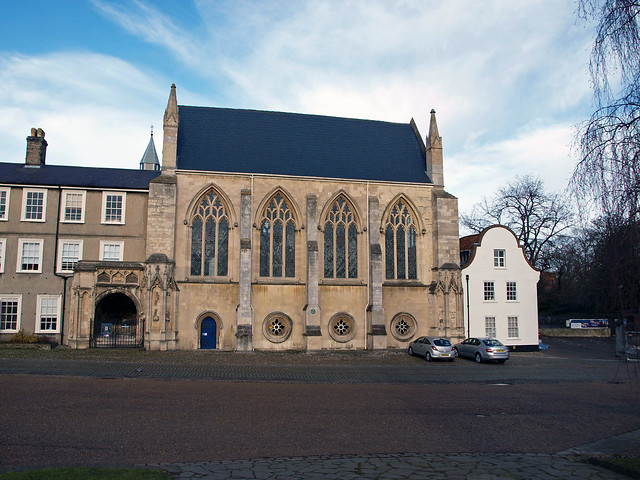The premises lie within the precinct, just W of the cathedral and N and NE of the Erpingham Gate. The College was founded by Bishop Salmon in 1316. The chapel is an extremely fine piece of that date, oblong and with polygonal angle-turrets at the SW and SE angles. It is distinguished by its spacious undercroft, with large, circular, beautifully cusped windows. The undercroft itself is of twice four bays with heavy piers of shallow chamfered projections and thick single-chamfered ribs dying into them. The upper chapel is lofty and has Perp N and S windows (and a shapeless E window) but the fine shafting and fine small leaf capitals of the founder’s time (cf. E window of Bishop Reynolds’s Chapel). There are also hood-moulds on head stops. Piscina with buttresses and a crocketed gable, again with leaf capitals. Doorway from the W, also with leaf capitals. Hood-mould with extremely delicate seated figures. Stoup with crocketed gable to its r. The staircase up to this doorway, which is the most distinctive feature of the group of buildings, was altered by Bishop Lyhart to connect the college with the chapel. Bishop Lyhart’s staircase, turning through 90 degrees at an intermediate landing, has an irregular rib-vault, but at its upper end, to allow for the early C14 doorway into the hall, the rib-vault suddenly turns up vertical and continues in relief as a wall facing the doorway. The DOOR is original early C14 work, including its beautiful iron hinges and decoration.
At one end of the Close is a bronze statue of Wellington with his sword; at the other Nelson stands with his telescope, sculptured in marble, looking to his old grammar school just within the Erpingham Gate. Founded as a chapel in 1316, and converted to a school by Edward the Sixth, the fine little building is now the school chapel, keeping its old trussed roof, the gallery with balusters, and the big windows adorned with an array of men and women with golden hair, some hooded, some wimpled, some in netted headdress. The old vaulted crypt (once a charnel house) is now the school’s library, and in it are several old chairs and a quaint list of school regulations. Quaint, too, is the porch added in the 15th century; at the top of its steps we can touch the bosses of its vaulted roof, and from it another flight of steps leads to the splendid old door of the chapel, charming with its old hinges of scrolls and leaves and its rich boss with an iron ring. George Borrow came to this school, and that Lord Justice Coke who hounded Raleigh to his doom.

No comments:
Post a Comment